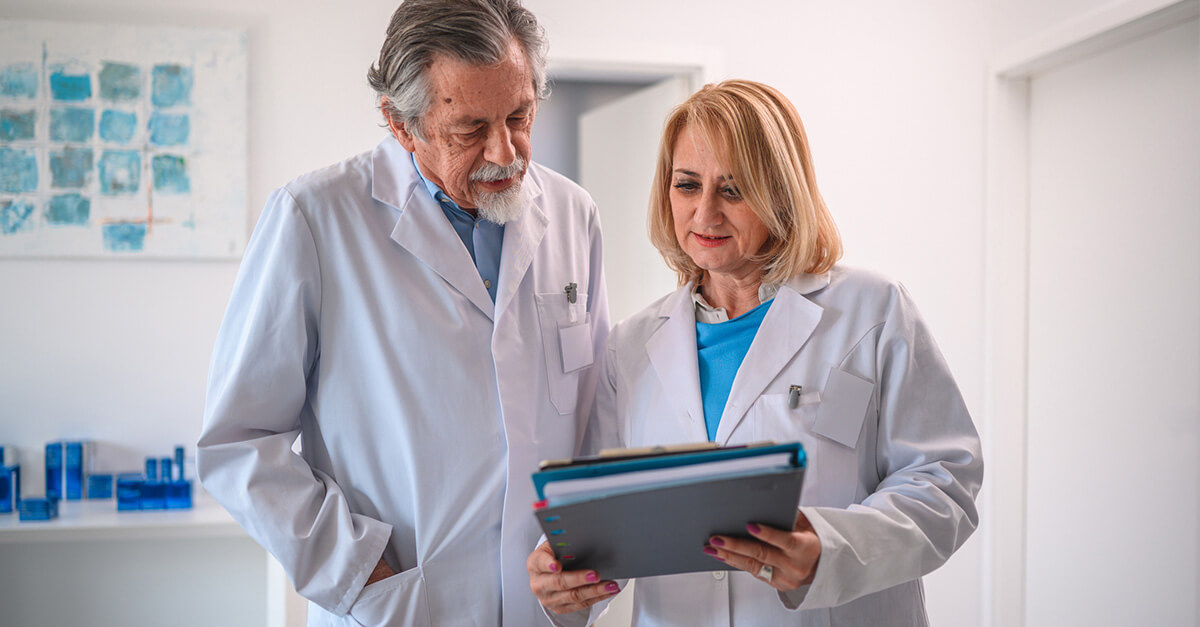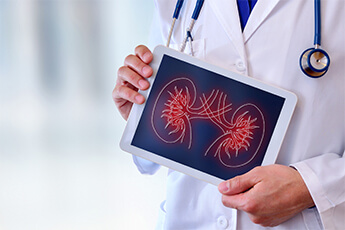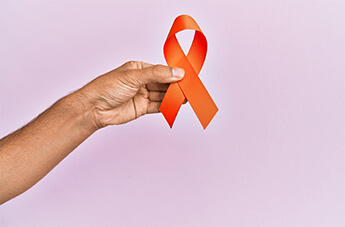Kidney cancer doctors: Urologists and oncologists


Approximately half of all cancerous kidney tumors are discovered when a primary care doctor orders an imaging test like an X-ray or CT scan. Most of the time, this doctor isn’t looking for kidney cancer. Instead, testing takes place to determine the cause of symptoms like blood in your urine. The finding of kidney tumors or kidney cysts often comes as a surprise to you and your doctor.
To confirm a kidney cancer diagnosis and start appropriate cancer treatments, your primary care physician may refer you to other doctors who specialize in treating the kidneys, kidney cancer, and kidney diseases. Your first stop will likely be a urologist.
From the community:“When I was 59 years old, I came home from work one day with more blood in my urine than urine! I went to the emergency room. The doctor was noncommittal, but he encouraged me to follow up with a urologist. I made an appointment with my husband’s urologist, who after a CT scan diagnosed Kidney Cancer. The kidney was removed within a few weeks. It was stage 3 Renal cell carcinoma. For 5 years I had a CT scan and followup visit with my doctor every 6 months. During that time I began seeing a nephrologist as I was in stage 3B kidney failure and I had hyper-parathyroidism as a result of losing my kidney.” – Inspire member
What is a urologist?
Urologists diagnose and treat conditions that affect your urinary system, which includes your:
kidneys, the organs that filter toxins and excess fluids from your blood and remove them in urine
ureters, the tubes that carry urine from your kidneys to your bladder
bladder, the organ that holds the urine until you pee
the urethra, the tube that carries urine from the bladder out of your body
The urinary system also includes the genitals, as well as the prostate gland and testicles in males.
How do urologists diagnose kidney cancer?
Urologists are often able to make a kidney cancer diagnosis based on imaging tests. If a previous X-ray or CT scan shows a tumor, you may get additional tests like:
CT scan with contrast dye
MRI
ultrasound
A biopsy, which tests tumor tissue for cancer cells, is the only way to definitively diagnose kidney cancer. Most of the time, a biopsy takes place after you undergo surgery (nephrectomy) to remove the cancer tumor or diseased kidney. Your urologist performs this surgery. In rare instances, your doctor may biopsy the tumor while it’s still in your kidney. If tests indicate kidney cancer, your care team will expand to include other specialists like oncologists.
From the community: “About 4 weeks ago I got Covid-19.While they were doing a CT scan of my lungs they saw a mass on my right kidney. I had to go back for another scan with injection to show more clearly. They told me it was cancer but it looked like it was localised to the kidney.I’ve seen a urologist and am scheduled for a total removal of my right kidney on May 3rd...” – Inspire member
What is an oncologist?
Oncologists are medical doctors who treat people with cancer. There are different types of oncologists who treat kidney cancer. You may see one specialist or several, depending on your diagnosis and treatment plan.
Types of oncologists include:
medical oncologist
radiation oncologist
urologic oncologist
Medical oncologist
A medical oncologist uses systemic therapies to target and destroy cancer cells. These cancer drugs circulate throughout your body, not just your kidneys. You may need systemic therapy if you have metastatic kidney cancer that has spread outside of the kidney or the cancer comes back after treatment (recurrent kidney cancer).
You may take systemic therapies by mouth, injection, or IV infusion. Systemic therapies for kidney cancer include:
immunotherapies
targeted therapies
Radiation oncologist
A radiation oncologist uses high-energy X-rays or particles known as radiation therapy to destroy cancer cells. You may need radiation therapy if you have pre-existing health conditions that make surgical removal of the tumor too risky or you only have one working kidney. Most people with kidney cancer get external beam radiation therapy, which means a machine sends the rays through your skin to treat the tumor.
You may also see a radiation oncologist if kidney cancer spreads to your bones (bone mets), lungs (lung mets), brain (brain mets), or other parts of your body. Radiation therapy can shrink metastatic tumors, easing pain and other symptoms.
Urologic oncologist
A urologic oncologist (uro-oncologist) is a urologist who has additional training in medical oncology. These doctors diagnose and treat kidney cancer and bladder cancer, as well as prostate cancer, penile cancer, and testicular cancer in males. A uro-oncologist has the expertise to perform biopsies and surgeries. They also provide systemic therapies (medical oncology).
From the community: “A year after my R/C, I had a kidney removal due to hydronephrosis due to scar tissue like others have experienced.A couple of months afterward, I had a bout of metabolic acidosis and since then I have seen a nephrologist on a regular basis. The acidosis was due to a combination of my now single kidney having to filter both my blood as well as urine being reabsorbed through my neobladder. There is a reason that many/most uros will not do a neo or IP unless the patient has two functioning kidneys. My kidney removal and acidosis were [many years ago] and I've seen my nephrologist ever since. I generally have an appointment every 4 months now. He is willing to go to every 6 but I like the shorter interval because I want to keep the one remaining kidney healthy. I get my blood drawn and tested a few days before my visit and he goes over the readings to to see kidney function. With my one kidney, my creatinine hovers around the 1.7 to 1.9 level and the doc is satisfied with that.” – Inspire member
What’s the role of a nephrologist when you have kidney cancer?
A nephrologist is a medical doctor who manages conditions that affect kidney function. These conditions include chronic kidney disease (CKD), kidney failure, and polycystic kidney disease (PKD).
As many as 1 in 3 people with kidney cancer will eventually develop CKD, which is a gradual decrease in kidney function. To protect your kidneys as much as possible, you may see a nephrologist before, during, and after cancer treatments. Your nephrologist may regularly order blood tests to check your estimated glomerular filtration rate (eGFR). Findings from this test indicate how well your kidneys are working. You can partner with your nephrologist to make lifestyle and dietary changes to slow the progression of kidney disease.
Sources
Key statistics about kidney cancer. American Cancer Society. January 2022.
Kidney cancer treatment. American Cancer Society.
Kidney cancer: Types of treatment. American Society of Clinical Oncology. October 2020.
Types of oncologists. American Society of Clinical Oncology. July 2021.
Specialties: Urologic oncologists and urologists. Cancer Treatment Centers of America. April 2022.
Urologic oncology. Cancer Treatment Centers of America. April 2022.
Step 2: Find a specialist for an accurate diagnosis. Kidney Cancer Association.
Your kidney cancer specialists. Moffitt Cancer Center.
Kidney cancer: What you need to know (PDF). National Kidney Foundation. 2017.
What are the roles of a nephrologist in the care of kidney cancer patients? UCLA Health.
Disclaimer
Member comments are lightly edited for length and to remove identifying information but are otherwise reproduced as they appear in the community as part of public posts.
This content is for general informational purposes only and does not necessarily reflect the views and opinions of any organization or individual. The content should not be used as a substitute for professional medical advice, diagnosis, or treatment. Please consult your healthcare provider about any questions you may have regarding a medical condition.




